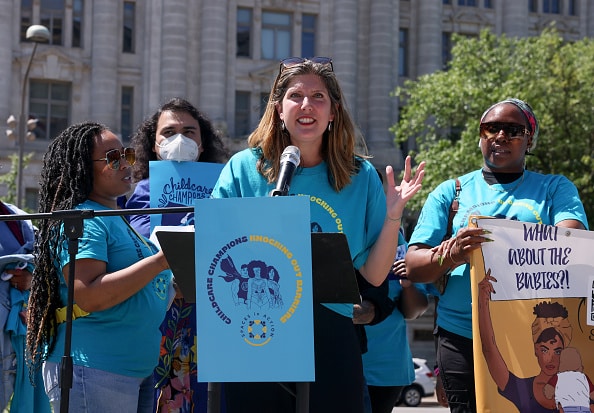
Melissa Boteach joined ZERO TO THREE as Chief Policy Officer in March 2025, bringing decades of experience in economic security, child care, and family policy. She previously led income security and child care advocacy at the National Women’s Law Center and founded the Poverty to Prosperity Program at the Center for American Progress. Throughout her career, Melissa has testified before Congress, shaped national policy debates, and worked across sectors to support families—especially women and children. Now at ZERO TO THREE, she is deepening her focus on the earliest years of life, championing policies that support infant mental health, child care, and economic stability for families.
If there’s one thing I’ve learned in my career, it’s this: policies aren’t just documents — they’re lifelines.
They shape whether a mother can feed her baby or must go hungry, whether a family can afford quality child care or whether a parent is forced to quit work to care for their infant. At the heart of these policies are real people — especially our youngest children — whose futures hang in the balance.
My journey has always been about championing economic security for women and families and building power for long-term change. I led the Poverty to Prosperity program at the Center for American Progress and then focused on child care and economic security at the National Women’s Law Center. I have researched social movements around the world, built programs to directly partner with directly impacted communities, and run interfaith organizing and advocacy efforts. Through it all, I saw the same truth: when we invest in babies and young children, we build a stronger future for everyone. And when we build power with parents, providers, and caregivers – we win.
That’s why I’m honored to join ZERO TO THREE as Chief Policy Officer. This organization has a bold vision: ensuring that every baby, every family and every caregiver has the support they need from day one.

Babies Can’t Wait: Early Investment Is Urgent and Essential
America is at a crossroads with how we support babies and toddlers. We can continue treating child care as an individual burden, deny parents time to recover from childbirth and and bond with their babies, leave millions of infants without the mental health care they need. Or we can stand up and push for a society that prioritizes families, where every baby has the chance to thrive and our future workforce is nurtured from the start.
Early experiences shape brain development more in the first three years than at any other time — with over a million neural connections forming every second. Now is the time to strengthen — not dismantle — the systems that give every child, regardless of background, the chance to succeed.
Child Care Is Essential, Not Optional — And It’s in Crisis
In many states, child care costs more than college tuition.
Meanwhile, early educators — overwhelmingly women and disproportionately women of color — earn poverty wages. This isn’t just a crisis for parents; it’s an economic crisis that prevents women from fully participating in the workforce and limits growth for all of us.
ZERO TO THREE recognizes that child care is a public necessity. We advocate for quality, affordable care and fair pay for providers. When families can’t find or afford care, careers stall, households struggle and babies miss out on vital early learning.
When child care is out of reach, careers stall, families struggle, and babies miss out on the early learning experiences that shape their future. We can, and must, do better.
melissa boteach
Time to Care: Paid Leave Is Essential
Nearly 1 in 4 women returns to work within two weeks of giving birth because they can’t afford unpaid leave.
That’s simply inhumane. Research shows that paid leave improves maternal and infant health, increases breastfeeding and strengthens family bonds.
But paid leave isn’t just for new moms — it’s for dads, caregivers, adoptive parents and anyone who needs time away from work to care for loved ones. If we want babies to thrive, we need to ensure their caregivers can be there — with dignity and financial security.
“The early years are critical to provide children with high quality settings to thrive in the long term. Investing in babies and toddlers is an investment in the long-term economic future of our country.”
Policies That Put Families First: The Safety Nets Babies Depend On
When parents don’t have enough to eat, neither do their babies.
When parents don’t have enough to eat, neither do their babies. When families can’t afford rent, that stress shapes a child’s development. Programs like Medicaid and SNAP and a fully refundable Child Tax Credit are lifelines — giving families the stability they need to care for their children.
We can’t let our youngest children bear the weight of political decisions that take away critical supports to provide families food, housing and basic security. At ZERO TO THREE, I’ll be deeply committed to protecting and expanding these programs — so no parent has to choose between groceries and a roof over their head.
A Future Built for Babies: The Moment to Act Is Now
Babies are not passive observers — they’re active learners shaped by every interaction.
Woven into all of these key policies and programs is the understanding that infant and early childhood mental health can have a lasting impact on lifelong health and well-being. Early support, from maternal depression screenings to trauma-informed care, can change the path of a child’s life. And supporting strong families helps ensure every baby has a strong start in life.
I didn’t come to ZERO TO THREE to talk about problems. I came to work for solutions. Because when we support babies and families, we build stronger communities — and a stronger economy.
Let’s work together — advocates, policymakers, parents, and community leaders — to create a nation where paid leave is guaranteed, child care is affordable, mental health care is accessible, and every family has stable healthcare and housing and can put nutritious food on the table.
When we invest in babies, we’re not just shaping their future — we’re strengthening the foundation of our own.
Let’s build that future together, starting now.


